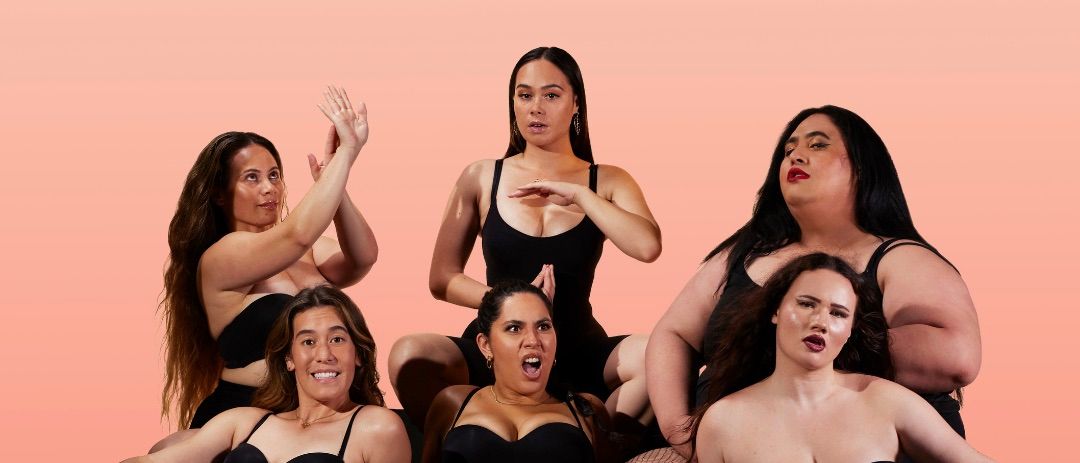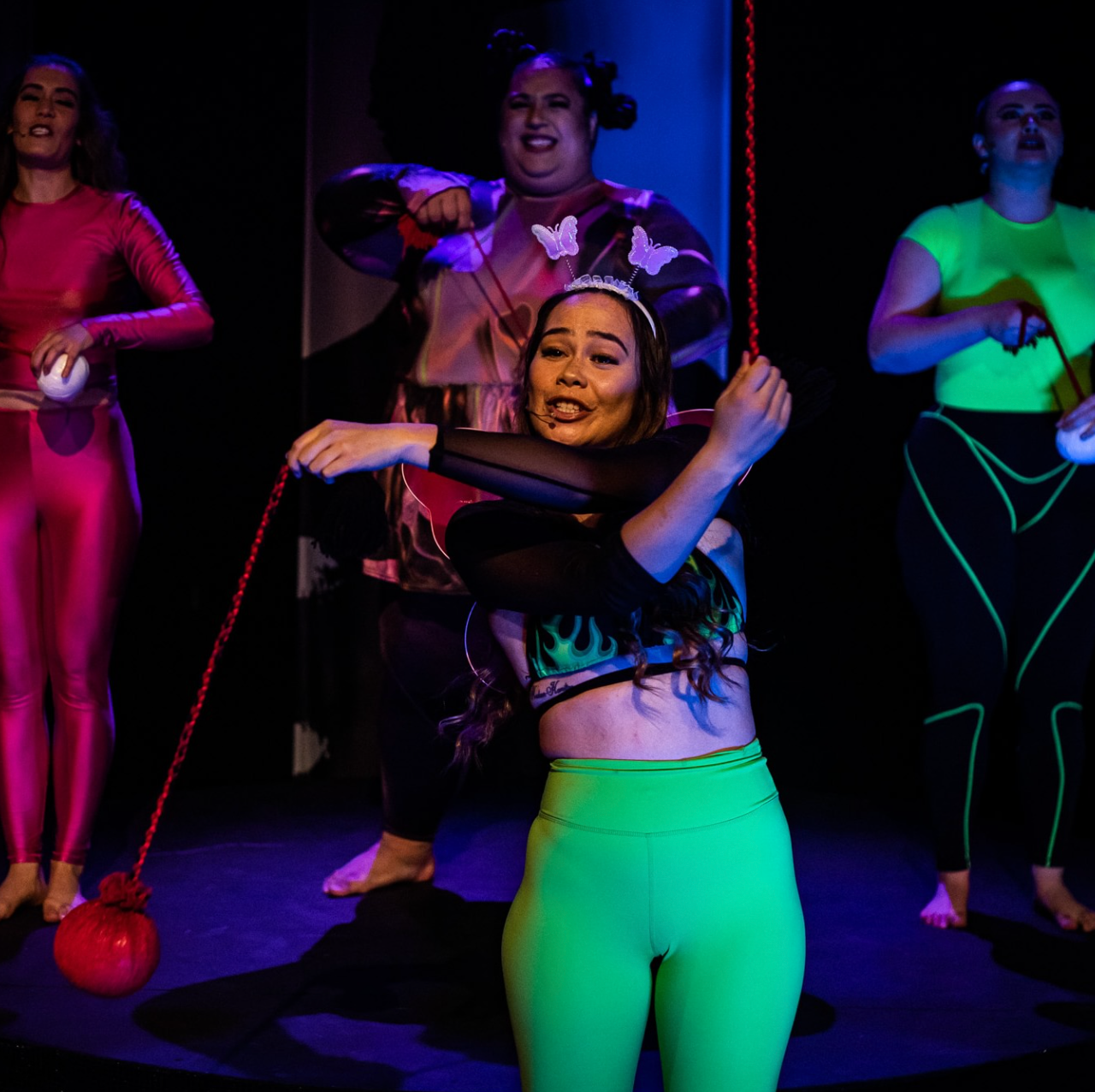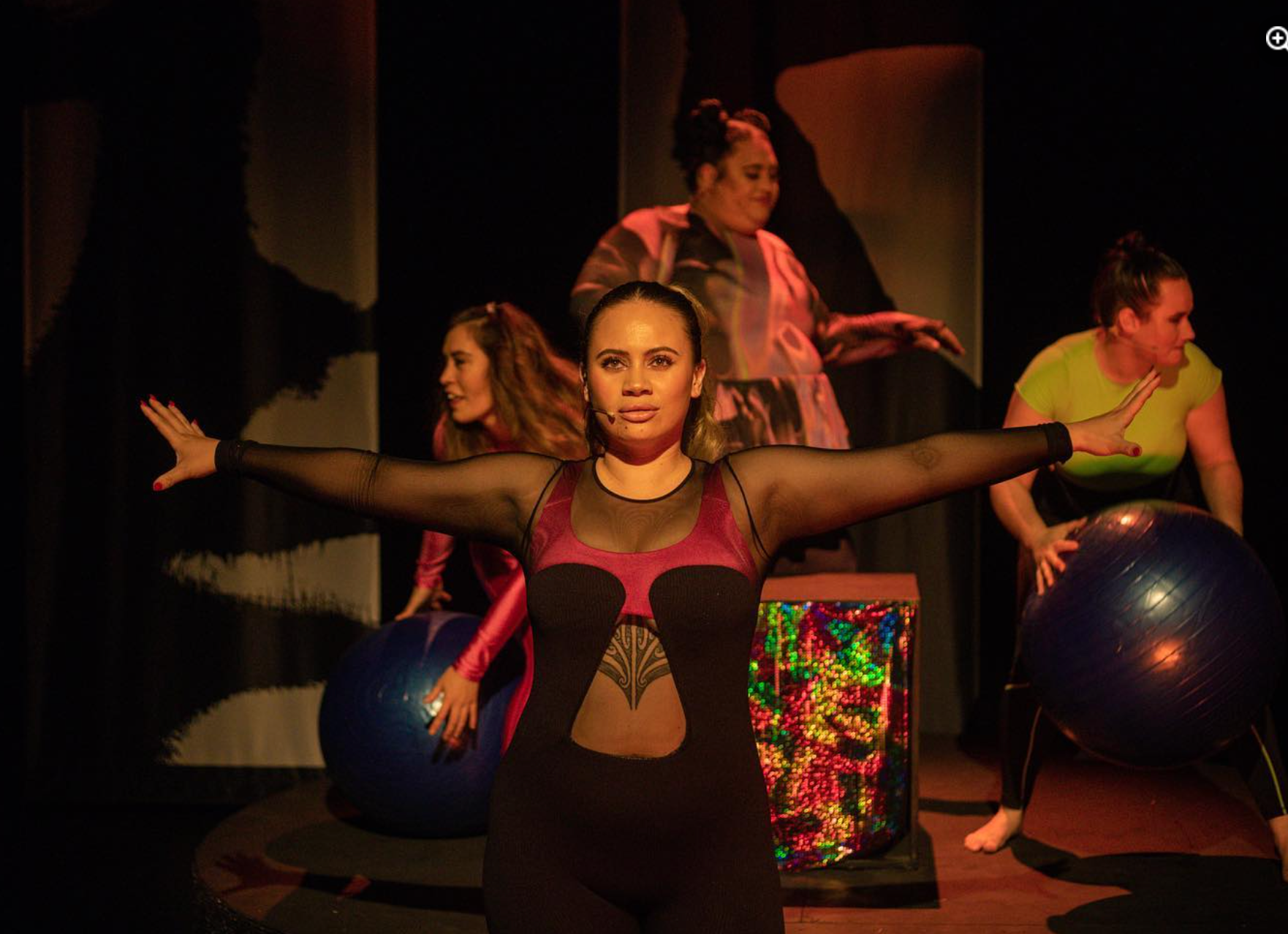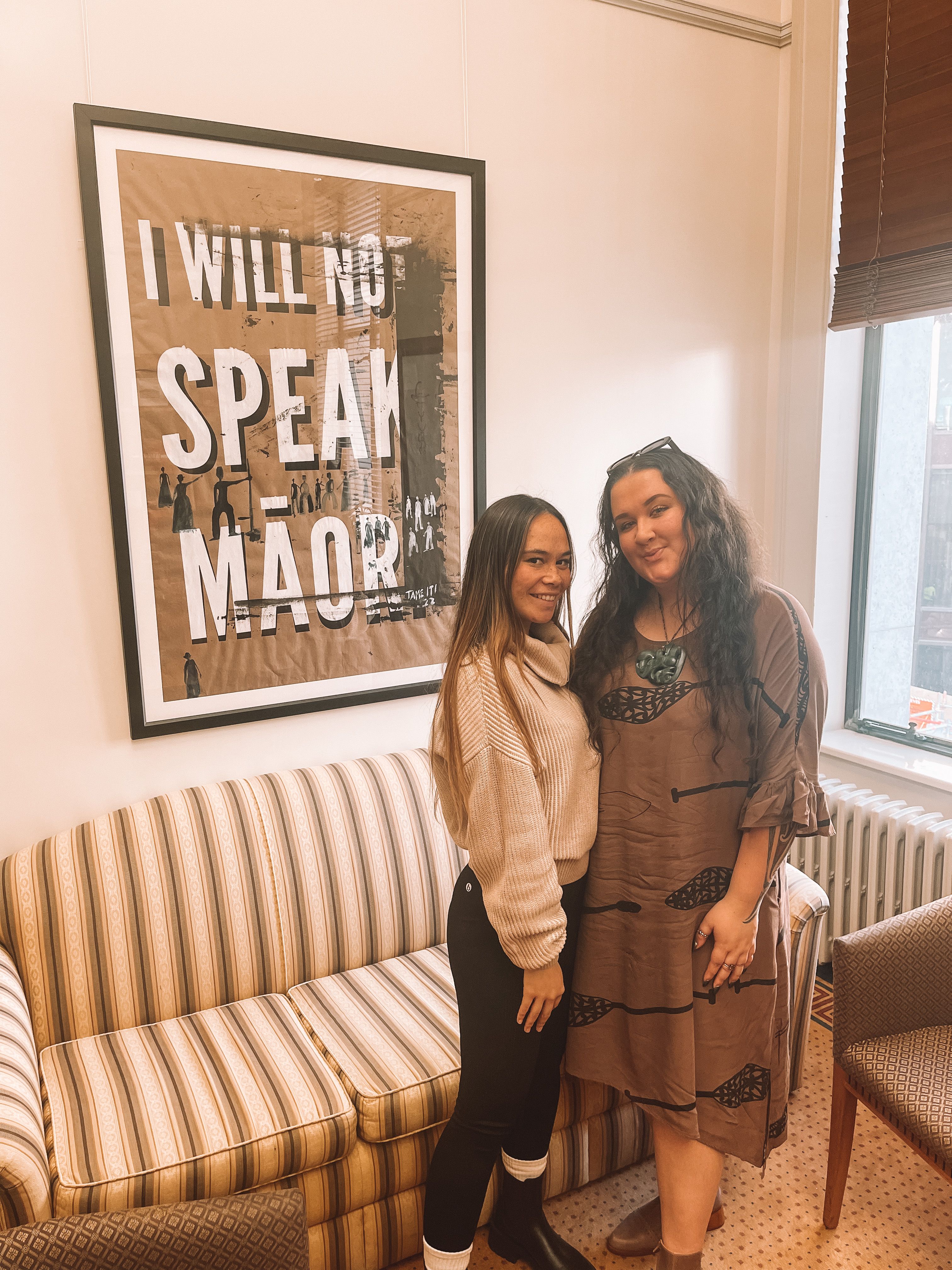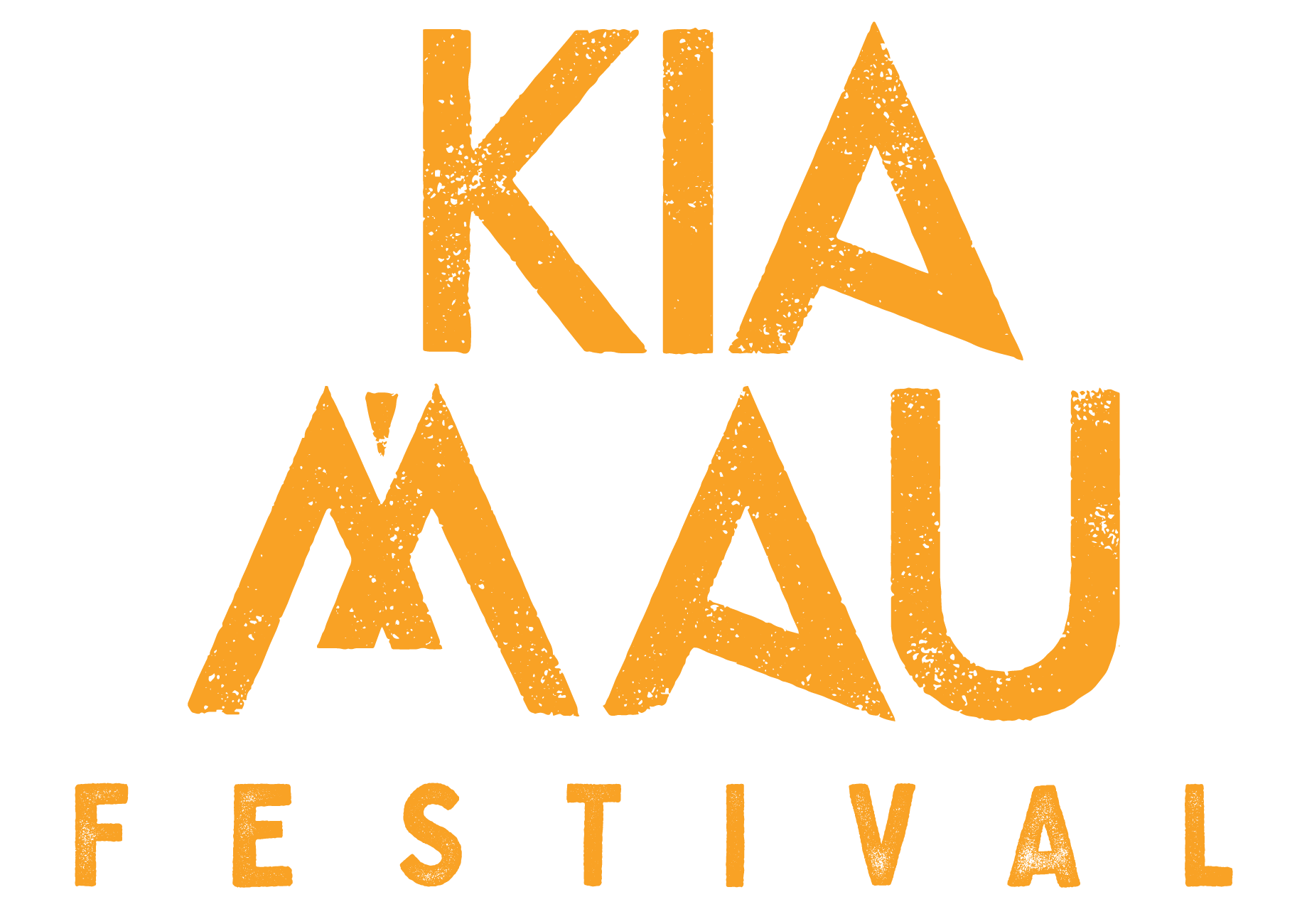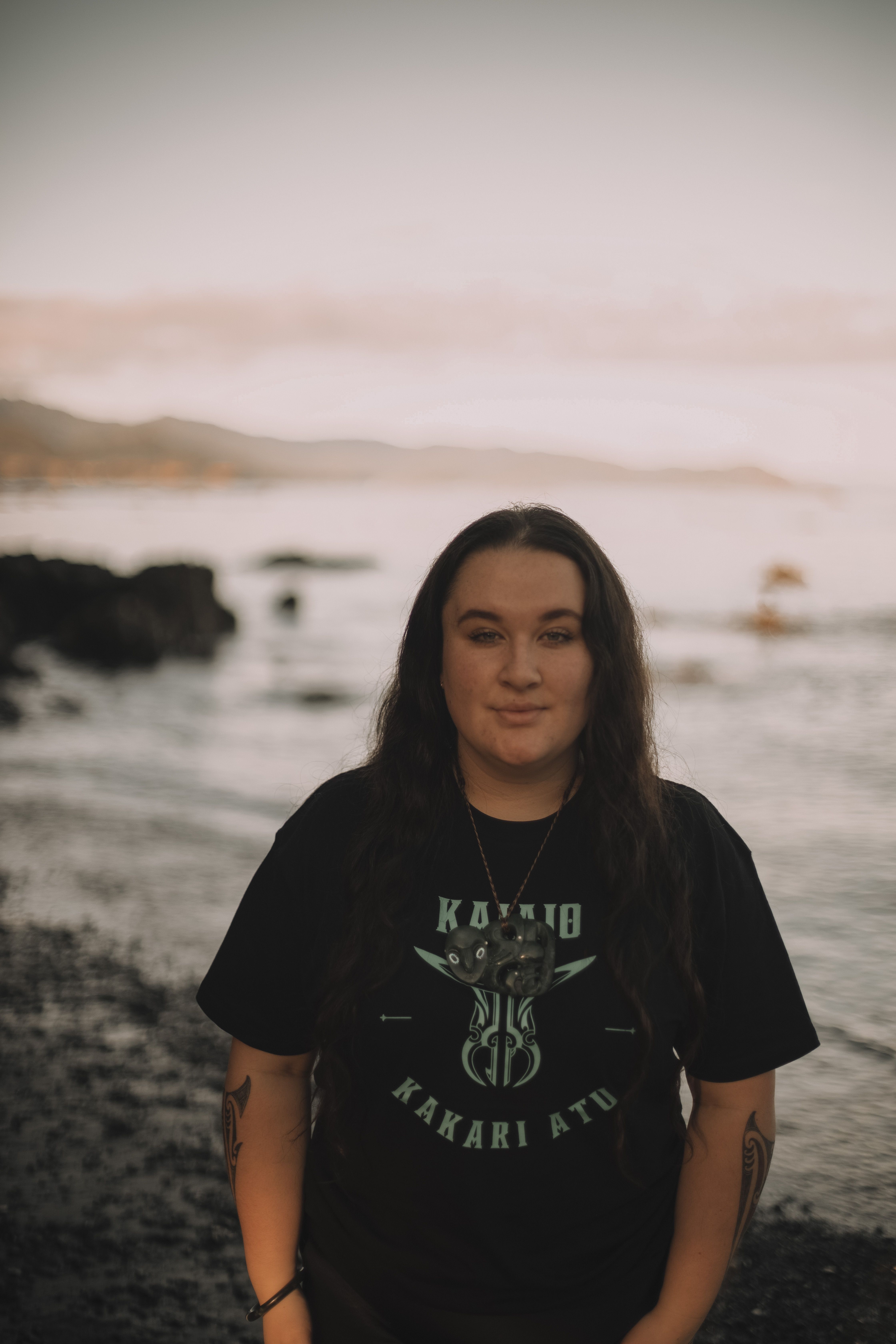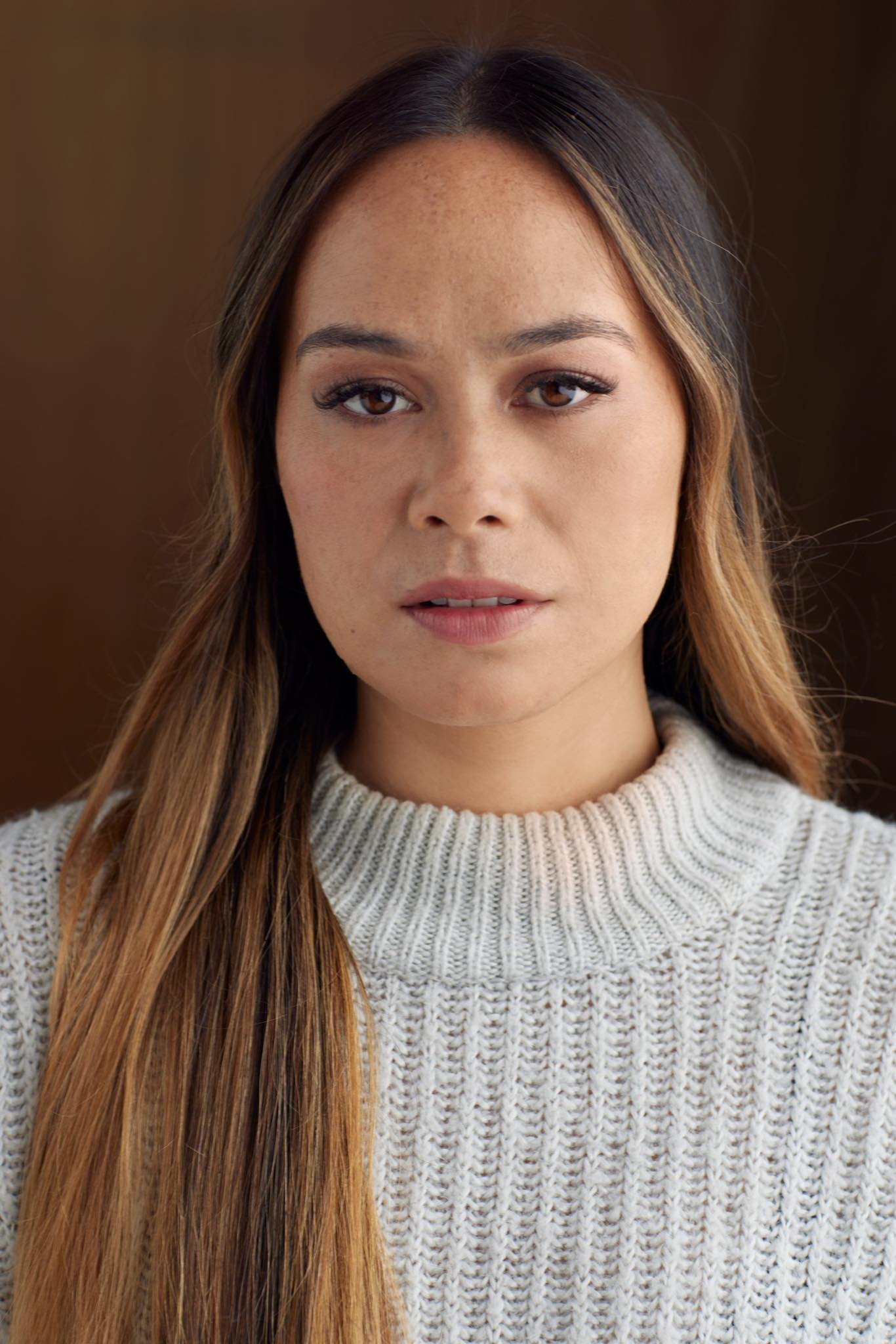Kōpū: An interview with Tuakoi Ohia
Te Mahara Swanson Hall sits down with her cousin, writer and actor Tuakoi Ohia, to talk about Kōpū, a new show that celebrates wāhinetanga.
Kōpū was a part of the Kia Mau festival in 2023. The show weaves live music, performance, poetry and poi together to form a hilarious, honest and no-holds-barred show about wāhinetanga today. The cast of six talented wāhine Māori are fierce, cheeky and seriously talented.
Te Mahara Swanson Hall sits down with writer and actor Tuakoi Ohia to talk about comedy, collaboration and being unapologetically wāhine Māori.
Te Mahara Swanson Hall: Kia ora cousin. Lovely to have you here.
Tuakoi Ohia: Kia ora cousin. Thank you.
Te Mahara: I have some pātai for you about your beautiful production Kōpū. Where did the whakaaro for this show come from?
Tuakoi: The idea actually came from a tāne, Tainui Tukiwaho, who is a director, writer, actor and one of our board members at Te Pou Theatre. He reached out to Brady Peeti and I, saying that he thought the whare needed a wāhine Māori show. He asked us to reach out to any mates who can sing, which was very easy, because a lot of wāhine Māori can sing. And then within an hour, the play was cast. So that’s how it started. But it took about two years of wānanga, of workshopping, of trying things. Those two years weren’t intentional – it was because of Covid. Otherwise, we would have probably done it in a year.
It was a collective of thoughts and ideas within our group. And one of the core ideas was to celebrate wāhine Māori. We wanted to showcase a lot of art forms like kapa haka, theatre, dance and singing. And what we didn’t want it to be was a ‘feminist’ show. We think that celebrating wāhine Māori is a different thing to speaking up on feminist issues, which is something that we talk about in our show. We tell everyone at the beginning to ‘leave their white feminism at the door.’
Te Mahara: It is great to know the whakapapa of how the show came to be! What are some of the audience reactions you’ve loved so far? And were there any that surprised you?
Tuakoi: The audience reactions so far have been incredible. All positive feedback, which is great. A surprising one for myself is wāhine Pākehā feeling empowered by the show – because the show was made for wāhine Māori and for Māori. But to have our non-Māori also feel empowered and inspired by it was surprising for us. In a good way, not in a bad way. We just didn’t expect it. And also, Pākehā males enjoying it too, and feeling impacted by it. So that was surprising.
We think that celebrating wāhine Māori is a different thing to speaking up on feminist issues, which is something that we talk about in our show. We tell everyone at the beginning to ‘leave their white feminism at the door.’
Te Mahara: It’s cool that it’s resonated with so many people. When you’re performing, is there a particular moment in the show that’s your favourite?
Tuakoi: There are a lot of moments that I love. In one part of the show, whānau from the audience can come up and sing karaoke with us. The first time we did it was for the opening of the Auckland season, and my Aunty Ata came up and sang. It’s a highlight every night – to be able to have our aunties enjoy themselves and cackle and be free to just talk back and be themselves. So we hope that there are aunties, and especially brown aunties, in the audience. We know we’re gonna have a good time because they’re having a good time.
Te Mahara: We love a karaoke moment! Is there anything you’ve learnt about yourself during this process of creating Kōpū?
Tuakoi: Because we’ve been developing it for two years, we’ve all grown within our own lives. But we’ve also grown as a collective and as a cast. One of our members is pregnant and is about to give birth in less than a month, so she’s definitely going through changes. I would say that it’s taught me how to be more outspoken, to be more staunch in my beliefs and to not care about what anyone thinks.
Te Mahara: Unapologetically wahine Māori?
Tuakoi: Yes, exactly.
Tuakoi performing in Kōpū.
Te Mahara: Fuuuuu neat alright! Can you paint a picture of what it’s like when you and the cast are hanging out, offstage?
Tuakoi: Offstage with the cast most of the time we have lots of puku laughs, lots of talks about our teke, like, just about our discharge and we’re always checking on each other. It’s a lot of really intimate things about our bodies, or our relationships or, you know, whatever, we have a laugh about it. We’re all very fiercely protective of each other. We have our fights as well, because in creative spaces that’s kind of inevitable. But it’s always for the betterment of the kaupapa. We do get sick of each other, too, and that’s all very normal. But we’re so close now that we’re basically all sisters, we act like sisters you know? We have a really, really strong bond now.
Te Mahara: I love it, it’s giving ‘I got all my sisters with me’. So Kōpū says “written by Tuakoi Ohia”, but what are some things that your cast contributed to the show?
Tuakoi: The cast have put their entire selves into the show. This show is devised, so we all created it. Everyone has specific skills that they bring, like Brady Peeti and Jane Leonard are experts in musical theatre, so they bring a lot of those elements. We have Ngākirikiri Kershaw and Te Arohanui Korewha, who are experts in kapa haka. We have Te Huamanuka Luiten-Apirana, who is a writer, musician and screen actress and who’s very creative – she brings a lot of her skill. So we all bring our own special talents and intelligence into the piece. And my job is to interpret all the kōrero that we wānanga about and put it into writing. But in terms of the actual content, it was all very much our collective ideas.
Te Mahara: That’s just getting me more excited to see the show. What has it been like working with Brady, and how do you think Māori perspectives on whakawāhine could change?
Tuakoi: Well, I guess, I’m not a trans woman. So I think Brady is the one to speak about those kinds of kaupapa. But as a friend, and as a sister of hers, she’s one of the first people that I met when first doing theatre. She has taught me a lot of things. And working with her, she leads a lot of the things for all of us, because she is, respectfully, the oldest in our cast. We didn’t want to tokenise our whakawāhine in this, but we did want to express that this is a space for them as well. As time goes by, hopefully there are more shows that celebrate our whakawāhine whānau. But the reason we had Brady was because of her talents and her intelligence and her as a person. So it’s really more about her, her mind and her soul rather than what she represents as her identity.
Te Mahara: Kia ora. That is really awesome that Kōpū showcases all aspects of wāhine in the show. Because I feel that there’re not that many spaces or places where that happens in Aotearoa yet.
Tuakoi: Yeah, not yet. And because we feel that the show will go on for a while, and there’ll probably be chances for other women to come in and take the space – so to have more trans women would be amazing. I reckon anyway.
As time goes by, hopefully there are more shows that celebrate our whakawāhine whānau.
Te Mahara: There’s some big conversations and kaupapa that you’re bringing to the table. So exciting. Who are some wāhine that have influenced your life as a wahine Māori?
Tuakoi: There are far too many to name. I grew up with a lot of strong wāhine Māori, not just in my whānau, but in my community. And especially because of the mahi that my parents did, being in Te Wānanga o Aotearoa, I was surrounded by a lot of wāhine Māori, a lot of outspoken women. I would definitely say my mother, for sure, but all my aunties, all my nannies. I know a lot of great mentors who have guided me through.
If I had to name one… Not even being cliché, but my mum, Kate Cherrington, does a lot of mahi, philanthropy, governance, and in education. She’s a leader in her own right and is quite respected by a lot of people. Not just because of her mahi, but because of who she is. My mum’s the bomb.
Te Mahara: Facts, can verify! What’s one thing you would say you learnt from your māmā?
Tuakoi: I've learnt a lot of things. But one of the things that’s coming to mind is that Mum taught me to never seek validation on my value from other people. To not rely on other people’s perspectives to affirm who I am. Not to not care about what other people think of you, but to not rely on that. Yeah, that’s really come in handy.
Te Mahara: Hard out you got to back yourself first. Aunty Kate’s so wise, she’s the best. If you could tell your younger self anything, what would it be?
Tuakoi: I would say, oh my God, don’t be so anxious about the dumb shit. And don’t be so anxious that your life isn’t gonna be fun. It’s very fun! When I was younger, I was scared that I would end up doing something that I hated. I think it’s because, unfortunately, a lot of people do end up doing what they hate. Which sucks. And I was scared that I was going to fall into that trap. But actually, I will say to myself, don’t worry about that shit. Just have fun. You’re all good.
Te Mahara: What kind of stories do you think Māori audiences need to see on stage?
Tuakoi: I think they need to see a lot more humour. I think they need to see the positive aspects of themselves. I think it’s wonderful that we have a lot of stories that talk about a lot of the trauma and the pakanga and all that kind of stuff. I think it’s really important. But it’s just as important to speak about the funny things and the lighter things that we bring to the world. I feel like that’s a lot stronger, too, because no one can fight against that or question it, because it belongs to us. Yeah, and just to be more open about the gross things and the tapu things that were instilled in us as being ‘bad’ by Pākehā. Not by a Māori, by Pākehā. We need to see more things that, yeah, just express who we are as Māori. We’re more than just our trauma. So much more than that. Yeah.
Te Mahara: Yeah. We’re a funny people!
Tuakoi: We’re so funny! We are so funny, and there’s this stupid conception that women aren’t funny. I don’t know if you’ve heard that but there’s a thing where people think, oh, women aren’t funny. We are fucking funny!
Te Mahara: Māori wāhine are hilarious, we got all the crack-up aunties to prove it!
Tuakoi: So funny! Especially wāhine Māori! Wāhine Māori are hilarious, quick, witty, gross, talented, I love it. It’s just, yeah, we need to see more of that.
Te Mahara: That is so true. And if you do meet a funny, quick-witted wahine, her humour often isn’t even dialled up to 100. If you are even lucky enough to recognise that you’re in the presence of a funny wahine, she’s probably still turned it down a bit.
Tuakoi: Yeah, exactly.
Te Mahara: Because not everything has to be real hōhonu vibes for it to land and connect with people.
Tuakoi: Kia ora!
Wāhine Māori are hilarious, quick, witty, gross, talented, I love it. It’s just, yeah, we need to see more of that.
Te Mahara: Are there any tips you have for aspiring writers?
Tuakoi: Well, I’m still quite new to writing. But what has helped me was to have a mentor alongside me to help. Someone more experienced who can guide and manoeuvre you into the place that you need to be. For me, I like to have timelines, and I like to have a bit of pressure. So if someone says, I need this draft done in two days, then I’ll do it in two days. If I was just like, kind of like ki wīwī ki wāwā, and just like, oh, I feel so inspired, I’m going to write something, I won’t finish it. Yeah, unlike my brother, Tahuaroa Ohia, who’s the complete opposite of me. He’s written like 20 things already. So you know.
Te Mahara: It’s a multitalented whānau of creatives!
Tuakoi: He’s very amazing, my brother. He’s a screenwriter, director and actor. But yeah, I would say to have someone to guide you. A mentor.
Te Mahara: Shot out to Tahuaroa, love you cousin. What do you love about the Kia Mau Festival?
Tuakoi: I love the wairua that Hone Kouka and Mīria George and Dolina Wehipeihana have instilled into the whole entire kaupapa – they’ve opened it up with so much manaaki and aroha to everybody. I love that everybody’s really comfortable with each other, that we feel really well looked after, and we feel supported by them. I love the people that have conceived Kia Mau Festival, who have created the foundations for this kaupapa, and it’s blown up quite a lot! We have a lot of people from overseas that have come. That’s what I love the most about it – the people. They’re amazing.
Ngākirikiri Kershaw performing in Kōpū.
Te Mahara: What are your next plans for Kōpū?
Tuakoi: Oh my gosh, well we want to tour everywhere! We want to tour all around Aotearoa, we want to tour all around the world. For the meantime, we have to have a bit of a rest because one of our members is hapū. But after she pops her kids out and has a little bit of a whakatā, that’s gonna be us.
Te Mahara: It’s going international!
Tuakoi: Yeah, we want it to go international. We’ve had interest from a few places overseas who have watched us recently, so that’s really cool. We just want it to go on and on and on for as long as possible because we think it’s important.
Te Mahara: Well, I just want to mihi to you Tuakoi Ohia.
Tuakoi: Oh thank you, Te Mahara!
Te Mahara: What a beautiful interview you’ve given today. So my final pātai will be: For any young wāhine Māori who are trying to pursue their dreams in the creative space, what would be your advice to them?
Tuakoi: My advice would be to find other wāhine Māori in this space, to be there with you. Because as Māori, we’re not the insular type. We’re a very collective people. So find people, do not be afraid to step into those spaces and make sure you know that there are always people there to help you. Take that first step. Don’t be scared of things that are new or things that may be uncomfortable. Be uncomfortable – you have to be uncomfortable in order to grow, you can’t be comfortable for the rest of your life otherwise you’re never going to grow so... who cares what other people think? And just think about our mokopuna in the future and what you can do for them. Whether you have them or not, it doesn’t really matter because we’re going to have heaps of kids come through anyway...
Te Mahara: And what an ao that will be!
Tuakoi: What an ao that will be! Just always think what you can do for them.
Te Mahara: Absolutely. Any last minute shout-outs if people want to follow you on your journey, or your rōpū?
Tuakoi: You can follow our Instagram page @ngawahineokopu, or @tepoutheatre who promote a lot of our kaupapa, and follow all the girls – you’ll see their names and a lot of our bios and stuff. Follow all the girls on Instagram. They’re all individually incredible artists in their own right, so everybody has their own thing going on, which I think is amazing.
Te Mahara: Ka pai, Kōpū ki te ao!
Tuakoi: Ka pai, thank you cousin!
Te Mahara: Thank you cousin, love you, bye!
Tuakoi Ohia and Te Mahara Swanson Hall
This piece is presented as part of a partnership with Kia Mau Festival. Kia Mau have supported the costs of paying our writers while we retain all editorial control.
